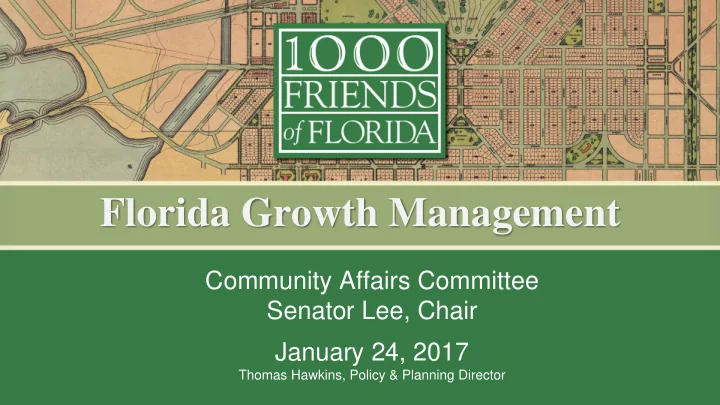

Florida Growth Management Community Affairs Committee Senator Lee, Chair January 24, 2017 Thomas Hawkins, Policy & Planning Director
Overview Intergovernmental Transportation Accountability coordination
Transportation
What’s working? Optional transportation concurrency • 2011 Community Planning Act made transportation concurrency optional • End to “last in pays” • Local governments moving forward with innovative replacements like mobility fees that promote redevelopment while funding transportation infrastructure • But, declining gas tax revenues and limited options for local governments to fund transportation are still obstacles
How to make it better? Make funding options available to voters - who want them • Charter County and Regional Transportation System Sales Surtax should be available to certain municipalities • The surtax funds capital improvements, as well as transportation operations • Counties with urban transportation needs but substantial Duval County, one of two counties with surtax, won prestigious 2016 suburban or rural populations face difficulty gaining voter APTA Award approval for surtax • Allow major cities to proactively address transportation needs with voter approval
What’s not working? Pedestrian & Bicycle Safety • Transportation is dangerous — by design • In 2014, drivers killed 2,494 people in Florida, more than twice the number of deaths in same year from homicide “Florida has the highest Pedestrian • Of victims, 588 — or 24% — were not using a vehicle Death Index of any state, and it’s home at time of death to eight of the ten most dangerous metro areas in the nation.” • No loss of life is acceptable, 1000 Friends of -Smart Growth America Florida’s goal is zero deaths and zero serious injuries from travel • Support work on FDOT context appropriate design
Accountability
What’s not working? Diminished State Planning & Review 2011 Community Planning Act limited scope of state review to adverse impacts to state resources and facilities. This is not working because: • local governments face no practical oversight to ensure their amendments comply with the Community Planning Act • responsibility to hold local governments accountable has shifted to private sector • state planning function degraded
Walton County example In 2015 Walton County proposes eliminating protections in comprehensive plan for globally imperiled coastal dune lakes without data and analysis Florida Statutes provide: “All... plan amendments shall be based upon relevant and appropriate data and an analysis by the local government…” FS § 163.3177(1)(f)
Walton County example “In 2014, the Florida Senate passed resolution 1-02023A-14 which recognizes the vital importance of Walton County’s coastal dune lakes to the ecological and economic health of the state … The amendment is not supported by adequate data and analysis which indicates that the amendment will not adversely impact the County’s dune lake system .”
Walton County example “We have reviewed the proposed amendments… and identified no comments related to important state resources and facilities within [DEO’s] authorized scope of review that will be adversely impacted by the amendments if adopted …”
How to fix it? The Legislature should: • Require Department of Economic Opportunity to determine whether comprehensive plan amendments are in compliance with Community Planning Act • Stop further diminishment of planning within the Department of Economic Opportunity • Change standard of review in comprehensive plan amendment challenges from “fairly debatable” to “preponderance of the evidence”
Intergovernmental coordination
What’s not working? Intergovernmental coordination Residents and local governments which will be impacted by major development proposals in adjacent local governments have no seat at the table to guide decisions. This is not working because: • Those residents experience declining quality of life and environment • Adjacent local governments sometimes forced to provide public services to accommodate growth in adjacent jurisdictions • taxation without representation • border skirmishes
How to fix it? • Allow impacted adjacent local governments to require dispute resolution process pursuant to FS § 186.509 • When dispute resolution does not resolve conflict, allow local government to challenge comprehensive plan amendment subject to preponderance of the evidence standard
Questions?
Recommend
More recommend